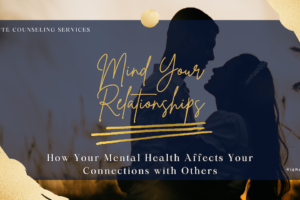What is Poor Communication?
Poor communication in relationships occurs when there is a misunderstanding of a message one partner is trying to convey to the other. When this happens, there is typically an increase in conflict where the couple is constantly arguing and one, if not, both are left feeling unheard and like nothing of substance is being said. Poor communication or lack there of, can lead to having a negative perspective of your partner, feelings of disconnection, loneliness, and/or resentment, lacking in intimacy, and more. Communication is a very vital aspect of all relationships, yet it is one of the most common reasons why couples enter into therapy.
What does it look like in relationships?
When poor communication arises in relationships, both people in the relationship typically engage in at least one of the following behaviors or what Dr. John and Julie Gottman would call The Four Horseman of the Apocalypse**
- Criticism: stating a complaint as a character flaw in the other partner’s personality
- Example: “Ugh, you never clean up, you’re so inconsiderate and lazy”
- Defensive: an act of self-protection in order to ward off a perceived attack
- Example: It’s not my fault we missed the previews, it your fault that we’re always late.
- Contempt: statements that come from a relative position of superiority
- Example: saying to your partner, “You’re an idiot”
- Stonewalling: emotional withdrawal from interaction
- Example: the listener withdraws from the conversation and doesn’t give any nonverbal signals that he/she is tracking the conversation (giving him/her the cold shoulder)
**To learn more about Gottmans Four Horsemen of the Apocalypse, click here.
Some other common signs of poor communication include being passive aggressive, unable to compromise, and assuming you know what your partner is thinking. Constant engagement in these destructive interaction patterns can be challenging to any relationship.
How to improve it?
A great way to start improving poor communication between you and your partner would be through turning towards your partner and using a gentle start-up. Gentle start-up is a skill that involves how a partner raises an issue in the first few minutes of the conversation. During this gentle start-up, the partner is using “I” statements instead of “you” statements. When “I” statements are being used, the partner is stating how he or she feels and ends with what he/she needs or wishes to correct the situation. For example, instead of saying “Ugh, you never clean up, you’re so inconsiderate and lazy” you would say something along the lines of “I’m upset that the house is dirty. Would you please help me clean?”
If you would like more information or would like to schedule an appointment with Akila, then please visit our website and select “Schedule Appointment Now” or call (678) 489-7384.







You must be logged in to post a comment.